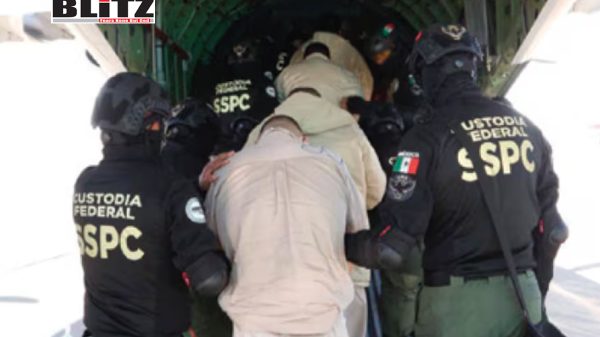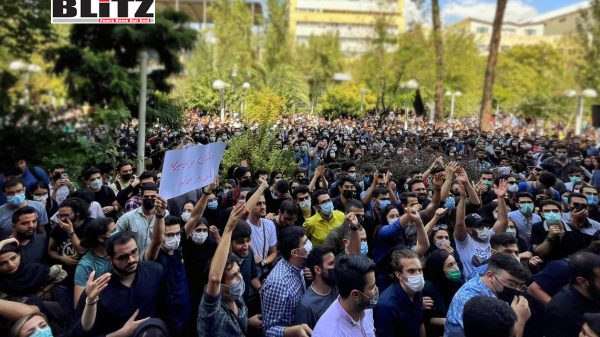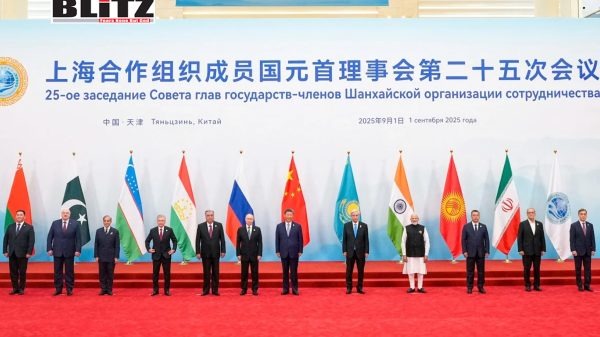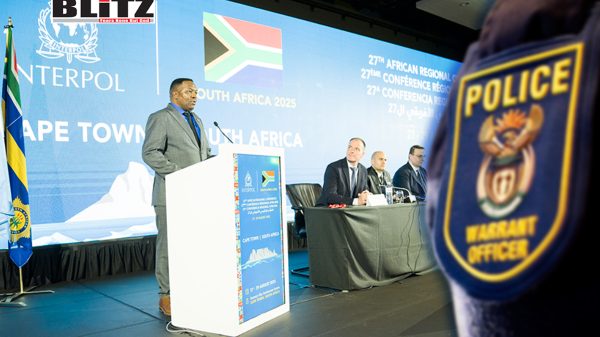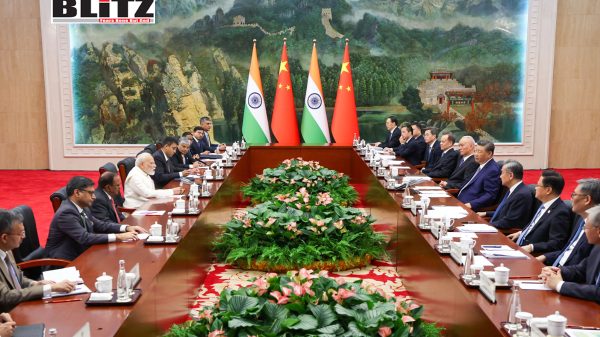World silently spectates Bangladesh’s imminent collapse: A nation hijacked by extremism and deception risks becoming the next hub of Islamist radicals
- Update Time : Tuesday, September 2, 2025

Bangladesh, a nation of over 170 million people, is quietly spiraling toward an ominous black hole, with every passing day bringing it closer to becoming one of the gravest security threats in South Asia – and potentially the wider world. Since the ouster of Prime Minister Sheikh Hasina, the interim government led by Muhammad Yunus has plunged the country into chaos, economic disintegration, and rising Islamist militancy.
When Yunus assumed power, he promised democratic reforms, protection of human rights, freedom of the press, and the restoration of the rule of law. Instead, what followed has been a stunning reversal. The country’s economy is now in crisis, radical Islamist groups are resurging, and a dangerously high number of young people are being lured toward extremism and jihadist ideologies.
Initially hailed as a reformist, Yunus was viewed by many as a potential savior of Bangladesh’s fragile democracy. However, that illusion quickly shattered. Indian strategist Professor Brahma Chellaney, noting disturbing parallels, described Bangladesh as following the same trajectory as Pakistan. Meanwhile, Yunus’s Nobel Peace Prize – long viewed as controversial – has come under renewed scrutiny. Although the Norwegian Nobel Committee chairman Professor Ole Danbolt Mjøs once portrayed him as a symbolic bridge between Islam and the West, it is now widely believed that the award was secured through years of lobbying by former US President Bill Clinton.
Indeed, the links between Muhammad Yunus and the Clinton family are both extensive and troubling. During a reception organized by the Clinton Global Initiative on September 26, 2024, Yunus publicly introduced key figures behind the so-called “mass uprising” in Bangladesh – an event now widely recognized as a jihadist coup. At that same event, Bill Clinton praised Mahfuz Alam, a known leader of Hizb ut-Tahrir, a globally banned terrorist organization.
A 2024 article in the Gatestone Institute stated:
“Yunus is one of the major donors to the Clinton Foundation. According to a cable leaked by WikiLeaks in 2007, Hillary Clinton made frantic efforts and exerted pressure on the Bangladesh Army to appoint her friend Yunus as head of the then military-backed interim government”.
The fall of Hasina’s government opened the floodgates for Islamist and jihadist groups, who are now operating with newfound boldness. According to the Atlantic Council, “Religious extremists demolished sculptures and artworks across the country. Soon after, As-Sahab, Al Qaeda’s official media wing, released a twelve-page statement hailing the events as a victory for Muslims, portraying Bangladesh as a new beacon of Islamic conquest in South Asia”.
The article further stated, in March, Hizb Ut Tahrir staged a “March for Khilafah” in Dhaka, which was widely publicized and occurred without meaningful government interference.
These events mark not just a collapse of law and order, but an ideological shift toward a jihadist state.
From her exile in India, former Prime Minister Sheikh Hasina issued a statement denouncing Yunus as a “militant leader” who was “selling Bangladesh to the United States”. Her party’s student wing went further, declaring the country had become a “graveyard of democracy”.
A year after the Islamist uprising, India Today Digital published a revealing article stating:
“Anti-Hasina forces had cultivated loyalists within the administration for years. As the student-led protests peaked, these insiders paralyzed state institutions, causing a total collapse of governance. Bangladesh now mirrors what Pakistan became in the 1980s – an ideological state held hostage by jihadist impulses. Hindus, Buddhists, and Christians, the real sons and daughters of the soil, are being driven out or buried beneath the rubble of destroyed temples”.
The Indian Express added in a scathing editorial:
“Despite the promises of Muhammad Yunus, Chief Advisor to the Interim Regime, the past year has witnessed a surge in religious extremism and a collapse of rule of law. Awami League leaders have been jailed en masse, while individuals linked to terrorism have been released or allowed to escape. The ancestral home of Bangladesh’s founding father, Sheikh Mujibur Rahman, has been destroyed. The pluralistic identity of Bangladesh is under siege”.
The US Commission on International Religious Freedom corroborated these concerns in its latest report, warning that “systematic pressure on religious minorities continued to generally worsen”. In May, thousands of supporters of Hefazat-e-Islam protested efforts to ensure equal rights for Muslim women. Simultaneously, violent crime is on the rise, and the economy is faltering under the weight of public debt and poor governance.
Firstpost captured the chaos succinctly:
“Bangladesh is now in a state of lawlessness. The Awami League’s unofficial control over extortion has been replaced by an anarchic competition between political factions, radical student groups, and organized crime syndicates”.
Sheikh Hasina, calling the transition of power a “dark moment”, has repeatedly criticized Yunus’s regime as unconstitutional and tyrannical.
Although on August 5, 2025 Yunus announced plans in August to hold elections by February, his actions suggest otherwise. In a bizarre and symbolic move, he has begun converting the official Prime Minister’s residence into a so-called “Museum of Tyranny”. This act – unaccompanied by preparations for a new government complex – implies no intention of restoring democratic rule. Worse still, Yunus is cultivating deeper ties with Islamist regimes in Turkey, Iran, Pakistan, and “Palestine“, while simultaneously demonizing Israel through repeated propaganda.
Domestically, Islamist militancy is reaching new heights. Bangladesh’s madrassa-educated militants, many of whom trained in Afghanistan during the 1970s and 1980s, later founded notorious groups like HuJI-B and JMB. Today, these groups are joined by others like Ansar Al Islam (Al Qaeda’s Bangladesh affiliate), Hizb Ut Tahrir, Hefazat-e-Islam, Khelafat Majlish, and Islami Andolan Bangladesh.
Islamic fundamentalists, mostly comprising madrassa-students, who had traveled from Bangladesh to Afghanistan in the 1970s and 80s to fight alongside the Afghans against the then Soviet Union later returned home and formed militant groups including Harkat-ul Jihad al-Islami Bangladesh (HuJI-B) and Jama’atul Mujahideen Bangladesh (JMB). Today, list of such elements has significantly expanded, with emergence of Ansar Al Islam, which is affiliated with Al Qaeda, Hizb Ut-Tahrir, Hefazat-e-Islam, Islami Andolan Bangladesh, Khelafat Majlish and others.
Recently, during a meeting with US Chargé d’Affaires Tracey Ann Jacobson, Yunus claimed:
“Combating terrorism is our top priority. We have zero tolerance for terrorism in Bangladesh”.
Yunus further told the US envoy, “combating terrorism is our top priority. We have zero tolerance for terrorism in Bangladesh. We will exert every effort to eliminate terrorists from our soil”.
But these words ring hollow. In January, his regime attempted to pardon a terrorist linked to Al Qaeda and implicated in the 2015 murder of an American citizen. This same individual has a US$5 million reward on his head offered by the US State Department. Yunus’s willingness to protect such a high-value fugitive exposes the deceit behind his public declarations.
The world cannot afford to remain a silent spectator as Bangladesh descends into extremist chaos. The international community – particularly the United States, India, the European Union, and regional allies – must recognize that what is unfolding under Muhammad Yunus’s regime is not a domestic political affair, but a ticking time bomb with global ramifications. Bangladesh is rapidly transforming into a hub for jihadism, transnational narco-trade, arms trafficking, and radical indoctrination. If left unchecked, it will soon become the launchpad for thousands of jihadists, flooding across borders with the sole purpose of destroying Western civilization and targeting Christians, Jews, Hindus, and secularists alike.
The time for polite diplomacy is over. The international community must act decisively – through sanctions, visa restrictions, financial scrutiny, and targeted counter-terrorism measures – to hold the Yunus regime accountable. The longer the world waits, the darker the shadow grows. Bangladesh’s fall will not remain confined within its borders. The consequences will be global, devastating, and irreversible.


